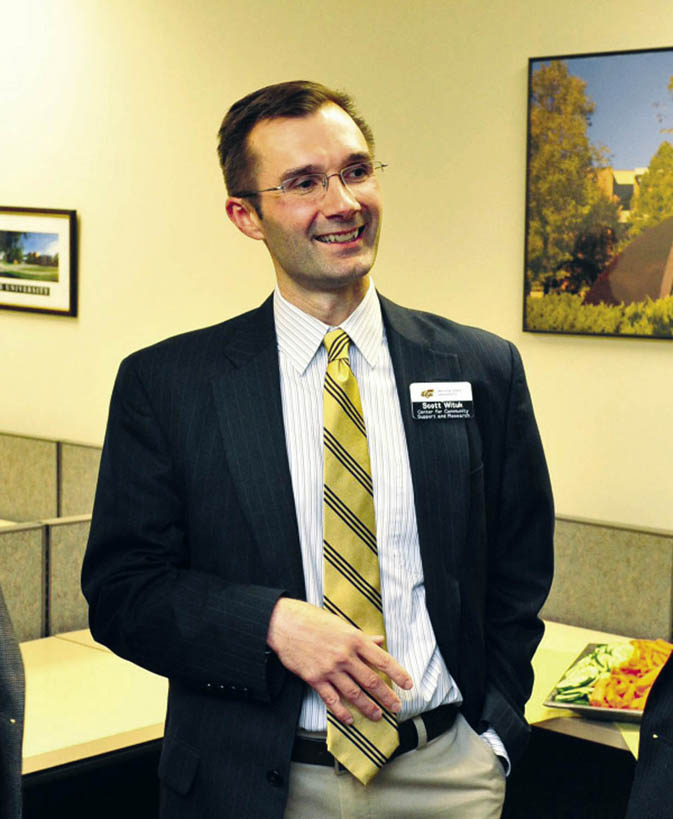
worked 13 years as the center's research coordinator
and has more than 25 peer-reviewed publications.
In his sophomore year at Wichita State, Scott Wituk '96/99/01 figured it would be useful to earn extra credit for one of his psychology classes by volunteering at the Self-Help Network of Kansas, a clearinghouse for support groups that was housed in the psychology department.
Wituk gained more than extra credit. He turned that volunteer experience into a 20-year career, helping contribute to the Self-Help Network's growth into the nationally recognized Center for Community Support and Research.
Over 30 years, CCSR has grown into offering not only self-help support groups, but also leadership development, organizational capacity building, public health initiatives – and much more. As varied as these areas are, the expertise offered through the center has a singular purpose: helping improve the health and wellbeing of Kansans and their communities.
Wituk – whose master's thesis on self-help groups and dissertation on leadership development were the results of his research work at the center – became the CCSR's executive director in 2009.
Growing up in the small, rural community of Pilsen, Kan., Wituk saw how people benefited and communities were made stronger when people helped one another. "That certainly impacted my thinking," he says. It also made him appreciate a community's ability to rally around a purpose.
The Self-Help Network got its start at the kitchen table of Evelyn Middlestadt, a Wichita social worker, who saw the value of people helping one another through support groups. In 1985, psychology professor Greg Meissen '77 brought the network to WSU, where it grew from several offices in the corner of Jabara Hall to occupying several floors in the WSU Downtown Center. Along the way, the network expanded its scope of service and its mission, to become CCSR in 2008. Today, the center has a staff of almost 50 who help transfer best practices and evidence-based strategies throughout Kansas.
Many of the center's service areas are outgrowths of research and expertise gained from earlier endeavors, from helping assess the level of available mental health services to helping create leadership programs. "We approach our work in an entrepreneurial spirit and try to learn from past initiatives," says Wituk, who served as the center's research coordinator for 13 years.
One of the center's early projects was the Kansas Community Leadership Initiative, which helped chambers of commerce move beyond basic meet-and-greet leadership programs to those that would build leadership skills among current and potential business and community leaders. The center has provided similar leadership training and coaching for several government agencies.
As the center's name suggests, research plays a big part in what the center does. Not only do Wituk and his staff collect data, they use the information to help the center's clients make informed decisions. "It's very exciting work," says Wituk, who called the center "a special place that I'm glad to be a part of for the past 20 years of my career" in the center's most recent annual report.
WSU's Center for Community Support and Research Turns 30
In 30 years, the Center for Community Support and Research has built an impressive record of helping Kansans help each other. Along with maintaining a searchable database of self-help groups, which was the center's initial mission, it provides service and research in these six areas: Leadership development through training, coaching, assessments and peer consultation; organizational capacity building in which the center works with an organization's boards and staff to better define and achieve objectives and goals; community collaboration in which the center serves as a neutral party to help community partners learn how to deal with community-specific challenges; research and evaluation done for various programs and organizations to give them evidence-based information to help with planning; mental health initiatives in which staff work with various providers, advocacy groups and consumer-run organizations to help those with mental health issues; and public health. In this newest service area, the center is partnering with the Kansas Department of Health and Environment on an initiative that focuses on public health and prevention efforts for the Medicaid population.





